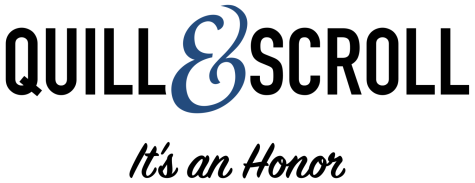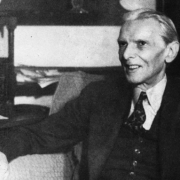Eye on Ivy Contest Winner: Class B
Below is the editorial that earned top honors in the first Quill and Scroll Editorial Writing Contest for Pakistani students, Class A, which included students in grades 9 and 10, co-sponsored by Eye on Ivy. The contest prompt asked students to examine various ways to protect themselves from misinformation on social media, as well as how these platforms affect current events.
By Daud Azfar
It was Pakistan’s founding father, Mohammad Ali Jinnah, who said while addressing a gathering of students in Lahore, referencing Pakistan’s youth, “You are the nation’s leaders of tomorrow and you must fully equip yourself by discipline, education and training for the arduous task lying ahead of you. You should realize the magnitude of your responsibility and be ready to bear it’’. These words couldn’t ring more true today, 75 years later, where the welfare of Pakistani youth is key to saving a rapidly declining nation from collapse. The last few years have seen a boom in social media use across the country, especially among the youth but to little benefit. Many would argue that its influence has only divided the country further but it’s undeniable that the power it possesses has the potential to do so much for a nation in desperate need of change.
From my own research and experience, the social media boom in Pakistan over the past decade or so has caused a huge threat to the welfare of Pakistan and its society. People like to say that social media is a double-edged sword but when it comes to Pakistan, it’s clear it’s done more harm than good. That said, the potential it holds in helping the nation advance and achieve the vision that Jinnah and Pakistan’s other founders had is unlike anything else. The difficulty is in creating the space for the proper utilization of these tools for the benefit of the country.
According to a UNDP report in 2017, 64% of Pakistan’s population is younger than 30, with 30% of the country in the youth bracket (between 15-29). In addition, data drawn from diverse sources like national surveys and youth indexes were used to form a representative sample of the youth from different backgrounds. The findings, according to the UNDP were as follows: 29 out of 100 young people are illiterate and only 6% have more than 12 years of education. Couple this with the fact that 57/100 youth (in the same survey) were neither working nor seeking jobs, with only 4% unemployed and actively looking for work and we begin to understand the problem. With the increase in access to the internet but a lack of exposure and education among the youth, it becomes very easy to fall prey to fake news and misinformation as well as waste incredible amounts of time on social media. Since the evidence indicates many are unemployed and not looking for jobs, especially women, for many it can become an escape from a toxic home environment that evolves into an addiction.
As we see with ourselves too, it becomes a crucial part of our lives, like a cup of coffee in the morning that you need to have, as the algorithm traps you in with content you like to watch and isolates you from everything else.
Bringing me to my second point, which is that social media has only further divided an already conflicted country. According to the Pakistan Telecommunications Authority (PTA), there are 121 Million 3G/4G internet users, with Whatsapp and Facebook users in the 45 Million range (as per Business Insider & Statistica respectively) as well as huge YouTube and Tiktok user bases.
However, instead of creating exposure and highlighting diverse views and realities to the Pakistani audience, these platforms have become battlegrounds for political domination, as well as hotspots for the spread of fake news and misinformation where all the information you see and hear is from like-minded people in a continuous loop, leading to greater division among various group and complete ignorance and disregard for other opinions.
When I asked Abdur-Rauf, an Anchor of Public News, with 40 years of experience in journalism in Pakistan about how social media has influenced the news intake of the youth and what impact fake news has, he had this to say: “Social media is fast becoming the main source of information for the youth. Studies suggest that the youth relies more on YouTube anchors than on the mainstream channels. The YouTube anchors don’t have a balanced policy. Their biased views have created division in youth..” He goes on to say “The social media users are mostly young and most of them are not very educated so they get influenced by fake news. The content of the news items is mostly sensational and it attracts the youth who without checking it start believing in it.”
Unfortunately, this misinformation makes its way to the rest of the country that is not online too. Who are mostly people with limited education from poor backgrounds who can be easily manipulated by the spread of such misinformation. For example, I recall that someone who worked in my own house refused to get vaccinated because she claimed the Covid-19 vaccine “kills you in two years”. This woman doesn’t have access to the internet and isn’t literate but the influence of the fake news that had been popularized through social media is so strong that it not just reached her but convinced her that the vaccine would kill her in two years! As funny as this story might sound, it’s actually a pretty sad reflection of the situation in Pakistan. Ironically, the educated Pakistanis aren’t much better off, at least among the older individuals who themselves spread misinformation and again get stuck in loops of propaganda and fake news.
It becomes clear then that social media is leading Pakistani youth to become lazy, isolated among like-minded people, gullible and unaccepting of other views. It has fostered division and promoted baseless ideas, playing on the gullibility of a poorly educated population with limited exposure to the outside world. How can a country expect to move forward when people are unwilling to exchange ideas and speak about their differences?
However, many do still hold the view that social media has had a positive impact on Pakistan, especially the youth. Aamna Haider Isani, a fashion journalist turned influencer who runs Something Haute, a popular YouTube channel in Pakistan with over 300,000 subscribers said this when I asked her about her views on whether the increase in the use of social media among the youth will ultimately benefit Pakistan and her views on misinformation and fake news: ”It has its pros and cons but social media has had significant benefit on the political landscape whereby political awareness, on micro blogging sites Twitter especially, has evolved because of transparency and freedom of speech..”, she continues to say that she thinks fake news is as widespread here as anywhere else but mentions that a lack of action on cyber crime is a big problem as with the rest of the legal system.
Social media has definitely had its share of benefits for Pakistan too. YouTube is a huge asset to students in accessing otherwise unaffordable or even unavailable education, entrepreneurship has taken off in the social media world with people opening up businesses left, right, and center and despite my earlier comments on isolation and greater division, it has also created a fair share of exposure to the outside world for Pakistanis especially those from rural areas.
Although I would argue that these upsides struggle to compare with the damage caused. A study at the University of Sindh Jamshoro in 2013, found that 36.5% out of a sample size of 200 students chose entertainment as their main reason for using the internet compared to 16.5% for education. Given that these were university students and this was almost a decade ago, you can imagine how much time Pakistani youth today spends on social media for entertainment purposes compared to for education or some other productive reasons.
But as I said earlier, I do believe that social media has huge potential in helping develop Pakistan if the space for its correct utilization is created. So what can the youth do to prevent misinformation and how can they use social media beneficially? Firstly, we need to assure ourselves that we’re getting our information from reliable sources and so it’s crucial to look for sources from your source. If they’re not using factual and credible information when speaking about objective topics, we need to learn to stop listening or at the very least stop believing. When it comes to a conflicting topic, always look at several sources for news, including trusted international news organizations, and be sure to look at the other side of the story. Not just because you can learn something and there’s a chance you’re wrong, even if you’re 100% right and you know it, look at the other side of the story simply for the exposure so you know what others in the country are thinking. And that’s also how you break the loop of the algorithm and end the ‘online bubbles’ that have been created. If the youth manage to talk amongst themselves and have civility in their discussions, even if the opinion of one particular side is ridiculous, it will ultimately benefit the country because exposure leads to the acceptance of different ideas as well as giving one the chance to contemplate if the view they hold is really true.
The government and social media platforms can also play a huge role in accelerating the creation of a positive environment in Pakistani social media if action is properly taken to take down patently false information and fake news channels as well as altering the algorithm to bring newer, different content and ideas to people more frequently. If the government incentivizes members of the youth to promote the spread of healthy content whether it be related to politics, education or even sports, I believe it’ll make a huge difference in the outlook and attitude of the youth that’s taking in all this information.
To conclude, social media usage in Pakistan has drastically increased among the youth, with the number of internet users increasing by 17% (by 11 Million) between 2019-2020 according to the PTA. Sadly, Pakistani social media today is a hub for misinformation and wasting time but if used effectively has the potential to unite and pacify a conflicted population, helping them equip themselves with “discipline, education and training for the arduous task lying ahead”, the task being the building of the country our forefathers envisioned and fought so hard for.

 Wikimedia photo by Ministry of Information & Broadcasting
Wikimedia photo by Ministry of Information & Broadcasting
Leave a Reply
Want to join the discussion?Feel free to contribute!